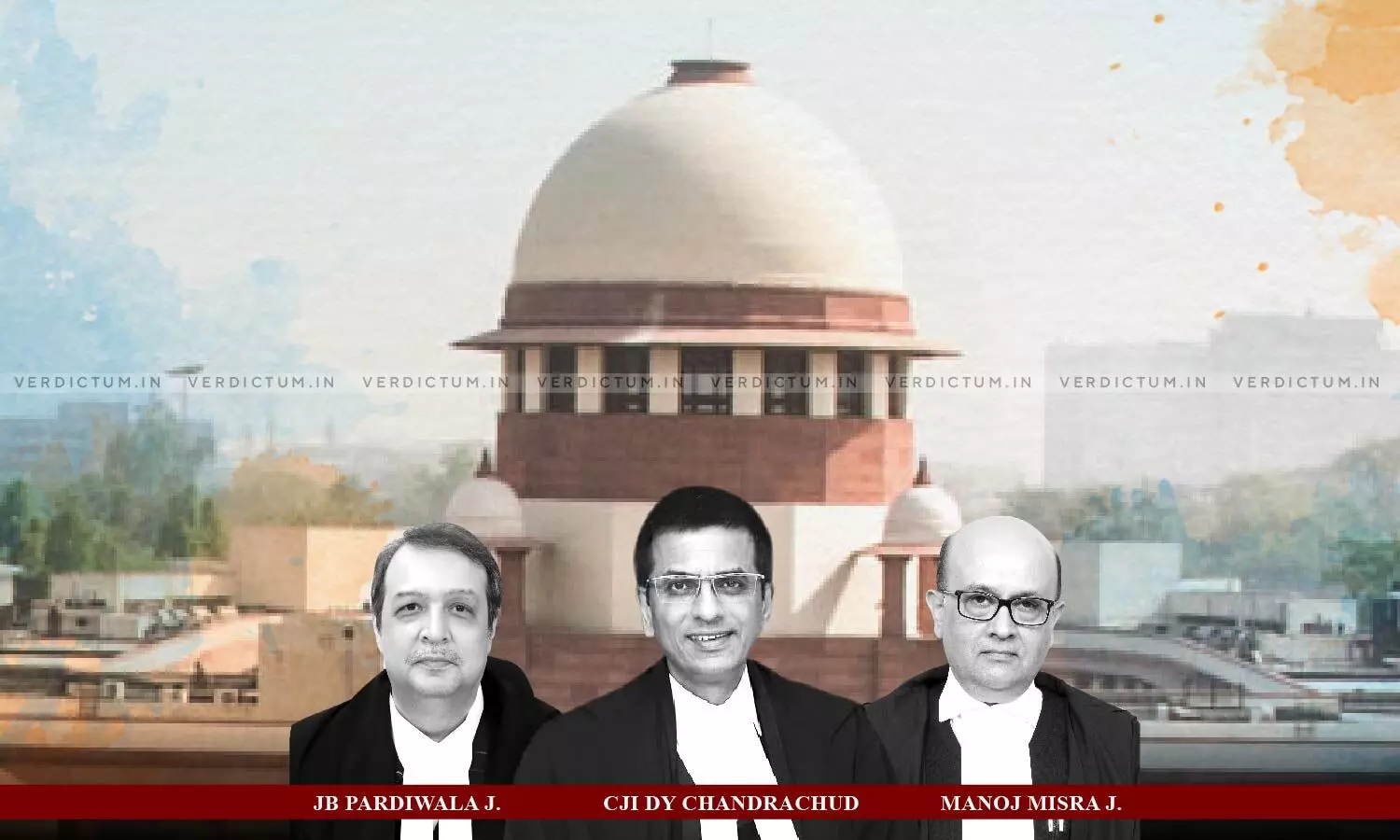
Non-Family Shareholdings In Property Cannot Be Bound By The Terms Of MoU Since They Are Not Parties To Document- Supreme Court
 |
|The Supreme Court has observed that non-family shareholdings, in any event, cannot be bound by the terms of the Memorandum of Understanding (MoU) since they are not parties to the document.
The Court allowed an appeal challenging the impugned order of the High Court, wherein the Court allowed applications under Section 8 of the Arbitration and Conciliation Act 1996 (Act, 1996) in two suits instituted by the first respondent. The Court observed that Canara Bank and Sachdeva & Sons were not parties to the Memorandum of Understanding (MoU) and therefore could not participate in the arbitration proceedings under Section 8 of the Act, 1996.
The three-judge Bench of Chief Justice D.Y. Chandrachud, Justice J.B. Pardiwala and Justice Manoj Misra noted, “In this backdrop and since the MoU was executed exclusively between the appellant and the first respondent, the reference to arbitration under Section 8 of the trial Judge was patently in error. Neither Canara Bank nor the company are parties to the arbitration agreement. The MoU has been executed between the appellant and the first respondent. The non-family shareholdings, in any event, cannot be bound by the terms of the MoU since they are not parties to the document."
Advocate Rajiv Talwar appeared for the Appellant and Advocate Vishal Mahajan appeared for the Respondents.
In this case, the Appellant and the first Respondent were brothers who conducted business together under the name Sachdeva & Sons. They purchased properties in the name of the Appellant and his deceased father which were later transferred to the business, and an MoU was signed to sell joint properties to pay off debts. The Appellant moved an application under Section 8 of the 1996 Act that the Trial Court dismissed but was later referred to arbitration by the High Court.
The Bench noted that there were two suits filed, in the first suit, the first respondent and Sachdeva & Sons Industries Private Limited were impleaded as defendants, even though the latter was not a party to the MoU. The relief sought in the first suit was an injunction against the alienation of certain land. In the second suit, relief was sought against Canara Bank, in addition to the two defendants in the first suit. The relief sought was a permanent injunction against Canara Bank from disbursing any loans or finances in the name of the first and second respondents regarding the landed property. The MoU stated that the appellant and the first respondent were part of the Sachdeva family and carry on business in various companies and partnerships. It also mentioned non-family shareholdings.
The Court held, “Admittedly, Sachdeva and Sons Industries Private Limited is not a party to the MoU which is executed solely between the appellant and the first respondent. In the second suit, apart from the two defendants who are parties to the first suit, relief has been sought against Canara Bank. While the relief which has been sought in the first suit is in terms of an injunction simpliciter from the alienation of certain land, the relief which has been sought in the second suit is for a permanent injunction restraining Canara Bank from disbursing or releasing any loan or finance in the name of the first respondent and the second respondent in respect of the landed property. Certain consequential reliefs have been sought against Canara Bank. Hence, it is evident that there are several parties to the suit who are not parties to the arbitration agreement”.
The Bench held that the High Court erred in referring the suit to arbitration under Section 8 of the Act, 1996 as Canara Bank and Sachdeva & Sons were not parties to the MoU. The MoU was exclusively between the Appellant and the First Respondent, and therefore the impugned judgment was liable to be set aside.
“For the above reasons, we set aside the impugned judgment and order of the Single Judge of the High Court dated 1 August 2017. In consequence, the applications filed by the first respondent under Section 8 of the 1996 Act shall stand dismissed. The High Court, while allowing the applications under Section 8 of the 1996 Act had directed the Civil Judge (Junior Division) to pass consequential orders. As a consequence of the present judgment, the consequential order which has been passed by the trial Judge shall no longer survive”, the Court asserted.
Accordingly, the Apex Court allowed the Appeal and set aside the impugned order and judgment of the High Court.
Cause Title: Vinod Kumar Sachdeva (Dead) Thr Lrs v. Ashok Kumar Sachdeva & Ors (2023 INSC 650)
Click here to read/download Judgment